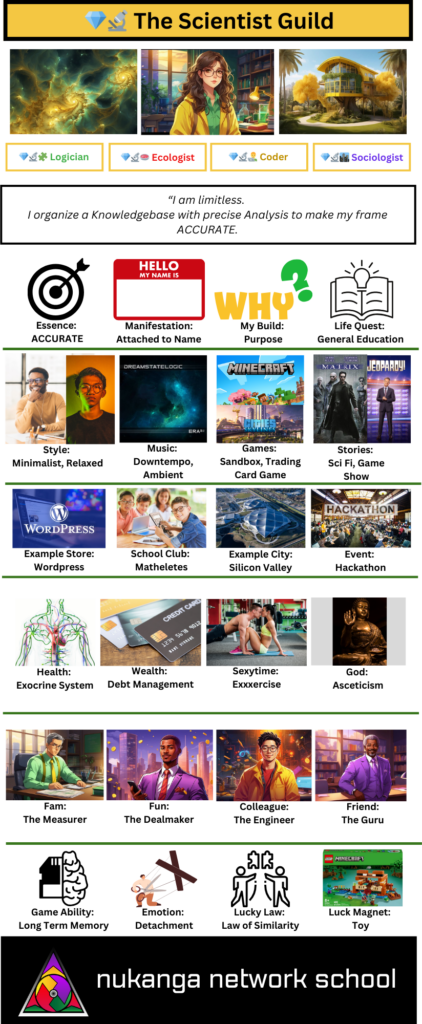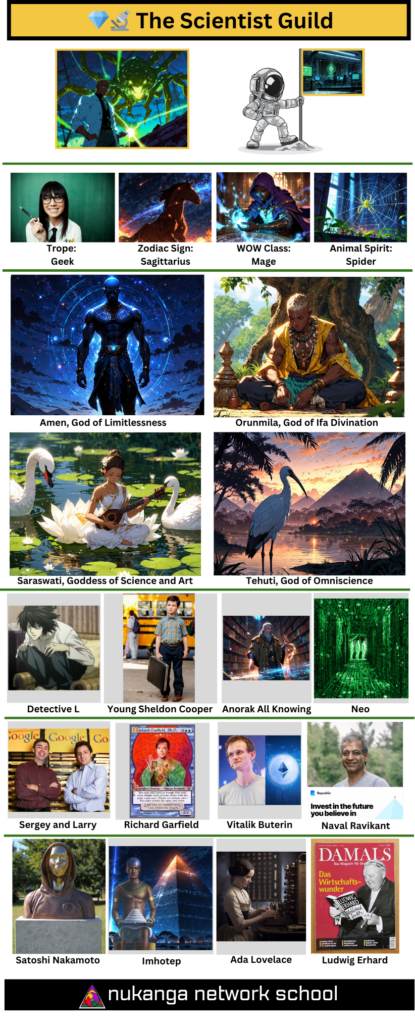

💎🔬 The Scientist Guild
Essence
- One-line Essence: Accurate
- Manifestation: Attached (connected to understanding and the pursuit of truth)
- Developmental Role: Purpose (to advance collective knowledge and refine the world)
- Life Quest: General Education Certification (seeking mastery and sharing knowledge)
- Life Story Themes: Sci-Fi Adventures, Game Shows
Specializations
- 💎🔬🏙️ Sociologist – Deciphers human behavior and societal patterns to build harmonious systems.
- 💎🔬👨💻 Coder – Architects of digital worlds, solving complex problems through programming.
- 💎🔬🧫 Ecologist – Guardians of nature, uncovering solutions to environmental challenges.
- 💎🔬🧩 Logician – Masters of reasoning and logic, bringing clarity to chaotic situations.
Identity and Values
- Quote: “I am limitless.”
- Frame Control: Analysis
- Quote 2: “I organize a Knowledgebase with precise Analysis to make my frame Accurate.”
- I Just Want to Make the World More: Enlightened, Connected, and Intelligently Designed
Symbolism
- Animal Spirit: Spider, Octopus, Owl (wisdom, adaptability, and intricate design)
- Zodiac Sign: Sagittarius
- Planetary Rulers: Mercury + Aquarius (corresponds to the 5w4 Enneagram Type)
- Trope: Geek, Math Nerd, Brainiac, Egg Head
- WOW Class: Mage
Cultural Elements
- Music: Downtempo, Ambient (calm and reflective energy)
- Uniform: Minimalist, Relaxed, Glasses (functional yet intellectual)
- Events: Science Fair, Gaming Tournament, Hackathon, Code Camp
- Find Me Here: Library, Museum, Planetarium, Laboratory, Computer Lab, Crypto Mining Facility
- School Clubs: Science Club, Foreign Language Club, Mathletes, Hackers Club, Crypto Club, Philosophy Club
Guild Relationships
Impact and Contribution
- What We Lose Without You:
- Deep understanding of language, numbers, and science
- The innovation behind blockchain, apps, and AI
- The study of philosophy, psychology, and religion
- The foundations of economics, analytics, and history
Luck & Emotion
- Luck Magnet: Model (precision and structure attract success)
- Law of Luck: Similarity (finding harmony through shared patterns)
- Emotion: Detachment, Disillusionment, Curiosity, Intellectual Excitement
Supernatural Attributes
- Supernatural: Long Term Memory (perfect recall and foresight through analysis)
Cultural and Spiritual Anchors
- God Aspect: Asceticism
- God Aspect 2: Rationalism, Perfectionism, Enlightenment, Minimalism
- Health Focus: Exocrine System (regulating function and balance)
- Wealth Focus: Control Debt (systematic and resourceful financial management)
- Sexual Expression: XXXercise (cultivating health and energy for peak performance)

Key Archetypes
- 4 Archetypes:
- Tehuti (Wisdom and Quantification)
- Saraswati (Creativity and Learning)
- Amen (Introspection and Perfection)
- Orunmila (Knowledge and Divination)
- 4 Prototypes:
- Detective L (Deductive Mastery)
- Young Sheldon Cooper (Unstoppable Genius)
- James ‘Anorak The All Knowing’ Halliday (Architect of Virtual Realities)
- Neo (The One, master of simulation and reality)
- 4 All-Stars:
- Sergey Brin and Larry Page: Creators of Google.
- Richard Garfield: Designer of Magic: The Gathering.
- Vitalik Buterin: Founder of Ethereum.
- Naval Ravikant: Angel investor and philosopher of modern economics.
- 4 Ancestors:
- Satoshi Nakamoto: Creator of Bitcoin.
- Imhotep: Architect and polymath of Ancient Egypt.
- Ada Lovelace: First computer programmer.
- Ludwig Erhard: Architect of Germany’s Wirtschaftswunder (Economic Miracle).
Arranged List of Notable Scientists
Fictional and Mythological Archetypes
- Saraswati (Hindu Goddess of Learning and Arts)
- Vishu (Preserver in Hindu Trinity)
- Tehuti (Nile Valley God of Wisdom and Writing)
- Amen (Hidden One, associated with inner peace and limitlessness)
- Neo (*The One, master of reality, The Matrix)
- Orunmila (Yoruba deity of knowledge and wisdom)
- Ifa (Yoruba system of divination and knowledge)
- Olodumare (Supreme Creator in Yoruba cosmology)
- Sheldon Cooper (*Prodigy physicist, The Big Bang Theory)
- Detective L (*Master of deduction, Death Note)
- Chinnamasta (Tantric Goddess of wisdom and transformation)
- Dr. Brain (*Fictional genius scientist, Dr. Brain series)
- Arachne (Greek mythological weaver and symbol of interconnectedness)
- Blue Ranger (*Tech expert and strategist, Power Rangers)
- Tails (*Engineering prodigy, Sonic the Hedgehog)
- Princess Bubblegum (*Scientist and ruler, Adventure Time)
- Hal 9000 (*Sentient AI, 2001: A Space Odyssey)
- Robot (*Innovator and strategist, Invincible)
- James ‘Anorak The All Knowing’ Halliday (*Creator of OASIS, Ready Player One)
- Dr. Miles Dyson (*Engineer behind Skynet, Terminator)
- Brainiac (Alien AI, DC Universe)
Real-World Innovators and Thinkers
- Zcash (Cryptocurrency for private transactions)
- Satoshi Nakamoto (Creator of Bitcoin)
- Vitalik Buterin (Co-creator of Ethereum)
- Imhotep (Nile Valley polymath and architect)
- Richard Garfield (*Designer of Magic: The Gathering)
- Philip Emeagwali (Computer scientist, early internet contributor)
- Katherine Johnson (NASA mathematician who contributed to space exploration)
- Zaha Hadid (Pioneering architect of futuristic designs)
- Sergey and Larry (Creators of Google)
- Tim Berners-Lee (Inventor of the World Wide Web)
- Ada Lovelace (First computer programmer)
- Neil deGrasse Tyson (Astrophysicist and science communicator)
- Stephen Wolfram (Mathematical and computational theorist)
- Sir Isaac Newton (Physicist and mathematician, pioneer of classical mechanics)
- Naval Ravikant (Investor and philosopher of modern economics)
- Joey Yap (Master of Chinese Metaphysics)
- Brian Armstrong (Co-founder and CEO of Coinbase)
- Fritz Haber and Carl Bosch (Chemists who developed synthetic ammonia production)
- Sir EA Wallis Budge (Egyptologist and philologist)
- David Steward (Entrepreneur and philanthropist)
- Ludwig Erhard (Architect of Germany’s Wirtschaftswunder)
- Neil Rackham (Author and researcher in sales and business psychology)
- Robert Cialdini (Expert on persuasion and psychology)
- Allan Alcorn (Inventor of Pong, pioneering video game developer)
- Jerry Yang (Co-founder of Yahoo)
- Adam Smith (Pioneering macroeconomist)
- John Maynard Keynes (Economist who reshaped macroeconomic thought)
- UsefulCharts (Educational content creator on history and philosophy)
- Marie Curie (Pioneer of radioactivity and Nobel laureate in two fields)
This list reflects the Scientist Guild’s profound contribution to the advancement of knowledge, technology, and human understanding, weaving together myth, fiction, and groundbreaking real-world achievements.
The Scientist Guild is driven by precision, knowledge, and innovation. With an insatiable curiosity and a commitment to accuracy, they are the architects of solutions and systems that shape our future. As guardians of wisdom and analysis, they ensure the world progresses intelligently and purposefully.

10 Precise Methods to Never Feel Stress and Never Make a Mistake Again
The Scientist Guild thrives on precision, accuracy, and methodical experimentation. These traits are the secret to eliminating stress and achieving near-perfection in any endeavor. By embracing the mindset of a scientist—where mistakes are merely data and stress is transformed into focused energy—you can master your environment and rise to new heights of consistency and excellence. Let’s explore 10 methods that will help you stay calm, collected, and flawlessly accurate.
1. Treat Life as an Experiment
Stress comes from the fear of failure, but scientists know failure is simply part of the process. Every setback is valuable data.
- How to Apply: Approach challenges with curiosity and a hypothesis-driven mindset. Ask yourself, “What can I learn from this?”
2. Build a Framework for Precision
Accuracy begins with a system. Great scientists rely on structured frameworks to ensure consistency.
- How to Apply: Develop routines for your daily life—whether it’s a detailed morning schedule or a checklist for work. Precision is built through habit.
3. Train Your Mind for Perfection
Repetition is the cornerstone of mastery. The more you practice, the fewer mistakes you’ll make.
- How to Apply: Set aside time for deliberate practice. Break complex tasks into smaller components and perfect each one before moving on.
4. Use Feedback as Your Superpower
Feedback isn’t criticism; it’s an opportunity for refinement. Scientists thrive on peer review to ensure precision.
- How to Apply: Seek constructive feedback from trusted colleagues, mentors, or friends. Embrace it as a tool to sharpen your skills.
5. Master Stress with Data
Stress is often caused by uncertainty. Data gives you clarity and control.
- How to Apply: Track your progress in key areas of life—finances, fitness, learning. Visualizing your improvements reduces stress and boosts confidence.
6. Rely on Simulations and Practice Runs
Scientists test in controlled environments before applying findings to the real world.
- How to Apply: Simulate scenarios before diving in. Practice public speaking in front of a mirror or run trial versions of your projects to identify potential pitfalls.
7. Break Down Complex Problems
Perfection comes from solving one small piece at a time. Scientists approach massive questions with incremental steps.
- How to Apply: Divide large goals into smaller, actionable tasks. Focus on completing one step with precision before moving to the next.
8. Prioritize Long-Term Memory
Great scientists rely on their ability to recall complex data and historical patterns. Strengthening memory leads to better decisions.
- How to Apply: Use techniques like the memory palace or spaced repetition to retain information. A well-trained memory reduces mistakes.
9. Develop Emotional Detachment
Emotions can cloud judgment, but detachment sharpens focus and enhances consistency.
- How to Apply: Practice mindfulness or meditation to create emotional distance from stressful situations. A calm mind is an accurate mind.
10. Strive for Perfection, but Embrace Iteration
Perfection isn’t achieved in one try; it’s the result of continuous improvement. Scientists iterate until they achieve mastery.
- How to Apply: Release yourself from the need for instant perfection. Focus on making each iteration better than the last.
Conclusion
The Scientist Guild embodies the traits needed to eliminate stress and achieve pinpoint accuracy: precision, consistency, and experimentation. By adopting these methods, you can turn mistakes into opportunities, stress into productivity, and your life into a masterpiece of exactitude.
In the end, perfection isn’t a destination; it’s a journey. Commit to the process, refine your methods, and let the scientist within you guide your path to a life free of stress and brimming with confidence.
